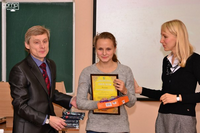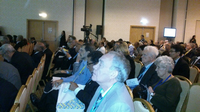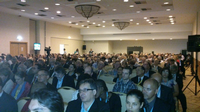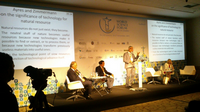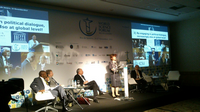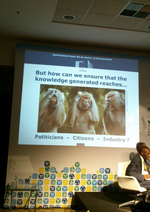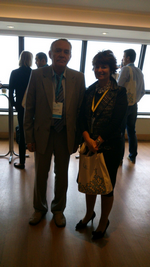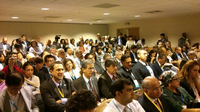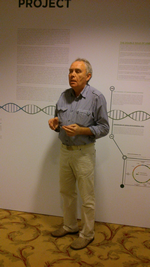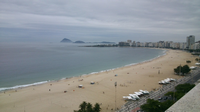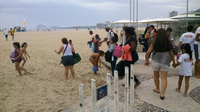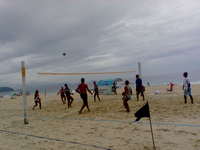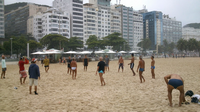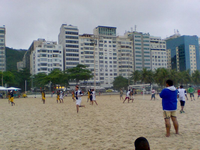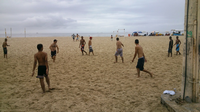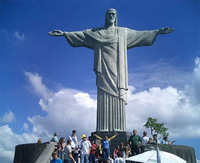| Rio Digest |
|
From November 23 till November 27 the Head of the Department of Economics and Business Administration from Sumy State University, Director of Institute for Development Economics Ministry of Education and Science and National Academy of Science, Dr. Prof. L. Melnyk took part in the World Science Forum, which was held in Rio de Janeiro. Participants of the Forum (Prof. L. Melnyk is in the forefront) Sometimes this Forum is called a scientific Davos. This is because of numerous participation of scientists from different countries. At the Forum scientists from all the continents, dozens of countries participated in discussion of the most important scientific problems. Forum participants – from all continents This time following the ideas of the World Summit “Rio+20” (2012), the Forum was devoted to the most important chalenges question – instruments and methods for ensuring sustainable development. The last means ensuring ecological safety, economic stability and social wellbeing for future generations of the Earth. In speeches of leading world scientists the most acute economic, social and environmental problems of participation of scientific community in ensuring sustainable development were tackled. In particular, issues of efficient natural resource use, education, and innovative policy, overcoming social and economic inequality were touched. It is reasonable to mention several remarkable phrases. Dr. L. Mello (Institute of Technologies and Innovations, Rio de Janeiro, Brazil): “Natural resources don’t exist themselves. They become”. It depends on human’s ability to see how to use, extract, transport, store and process them… Dr. L. Mello’s speech Prof. Dr. L. Davidovich (professor of physics at Federal university of Rio de Janeiro): “…When the Minister of Finance asked the inventor of electricity Faraday: “Can your invention ever be of any advantage?» he answered: “Sometime thanks to it you will be able to collect much more taxes”. The Speech of Chief Scientific Advisor to the President of the European Commission Professor, Doctor Anna Glover (who is also the Head of the Chair of Molecular and Cell Biology at the University of Aberdeen in Scotland) was extremely bright. In particular, she figuratively characterized behaviour of politicians, citizens and businessmen in relation to environmental problems. Prof., Dr. A.Glover’s speech From A.Glover’s presentation: “Politicians don’t “see” environmental problems, citizens don’t want to hear about them, business stubbornly suppresses During the Forum polemic Dr. P. Kabat (Director of Institute of Applied System Analysis, Laksenburg, Austria) was asked: – Are there any problems concerning the fact that “green energy” actually becomes the competitor to agricultural production for example, on those lands where the raw materials for biodiesel and bioethanol are grown? The answer was: – Certainly, problems arise where “green power” is developed light-headedly. It must be directed at waste processing… However it is not the biggest problem. I am afraid, for example, even to think about the time when cheap slate gas will rush in world economy. It will preserve power-intensive (so, environmentally dangerous) industries and will sharply slow down scientific and technological progress. Today high prices of traditional energy resources force to search for “green” alternatives and to fight for essential increase in production efficiency. In a break Prof. L.G.Melnyk and Prof. A.Glover discussed education problems for sustainable development Prof. L.G.Melnyk as one of well known editors of educational literature in the field of sustainable development was invited to work in the section “The Role of Higher Education in Building a Critical Mass for Global Sustainability”. With his question: “Who from whom has to learn: students from teachers or teachers from students? ” he initiated the discussion during the workshop. Participants came to a conclusion that learning process has to be mutual. Students as potential carriers of interests of future generation have to be active subjects of educational process, and teachers who absorb experience of mistakes and past victories, have to act as peculiar carriers of social memory. Thus, the role of interactive training methods has to rise constantly. Prof. L.G.Melnyk initiated workshop discussion The Forum took place in “Atlantic” hotel near Copacabana world famous beach. View of Copacabana beach from the roof of Excelsior hotel, where Forum participants lived Free of charge beaches in Rio de Janeiro Here, on Сopaсabana beach, recollecting Yalta (with its single “entrance tickets to beach” for 50-100 UAH) you begin understanding better why it is necessary for Ukraine to join Europe. Beaches in Brazil are free of charge as they are people property. Bulgaria “recovered” from “Yalta illness” after it joined EU. Minutes of free time gave an opportunity to observe life of inhabitants on the beach … It is also a pity that only minutes, because this performance deserves much more attention. Whatever game men of different age played on Copacabana beach, almost for certain it will appear to be a football version. If you see from a distance that someone is playing volleyball through net, you cannot doubt that it is an optical illusion. In this game it is possible to beat a ball with any parts of the body except hands. Football – over a net If you see that men are playing staying in a circle in a volleyball way, beating a ball it is football too. Because feet, heads, shoulders, backs, in general anything is used except hands… And, certainly, play only barefoot. Football – “in a circle” As on fire, it is possible to watch this game continuously, because the ball doesn’t fall on the sand for 5-7 minutes. Certainly, there are also quite conservative versions of beach football … in any forms: from 5 x 5 … to 11 x 11 … And, in an adult way – in uniforms, with referee and fans. Football 11 х 11 Football 5 х 5 Rio is preparing for Christmas …. What will a new 2014 bring to mankind? Christ the Redeemer Statue From the height of the bird’s flight on the city where the World Declaration on Sustainable Development was signed, Christ the Redeemer (He is called so in tourist guides) silently looks, as though hinting that the mankind has to redeem ecological sins themselves. |
